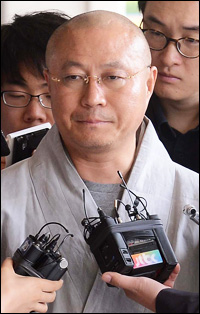
Is taxing religion an act of blasphemy?

Gambling monks scandal raises old issue anew
The gambling scandal shadowing the country’s largest Buddhist order has triggered debate on whether the government should collect taxes from temples, churches and religious organizations.
For decades, there has been an argument over taxing monks and clergymen, but little progress has been made on the issue due to the political sensitivity. Critics, however, say a series of embezzlement and corruption cases involving religious groups in recent months underscores the fact that taxing religions should no longer be overlooked.
Last month, eights Buddhist monks, including two senior members of the Jogye Order, were secretly filmed gambling at a hotel suite room with hundreds of millions of won, which were believed to donations from believers. The release of a video clip recorded by a hidden camera showed them drinking and smoking while they were gambling and the footage has sparked a public outcry.
Christian churches have often become the target of public criticism for misappropriation of funds.
Cho Yong-gi, pastor and founder of the Yeouido Full Gospel Church, the country’s largest church, and his family members have been criticized for allegedly privatizing the church’s assets.
Cho’s son, Cho Min-je, who is chairman of the Kukmin Ilbo, a Christian daily newspaper, was questioned Tuesday by prosecutors for embezzling money from an affiliate company. Cho is also facing allegations that he misused government subsidies to the newspaper. Unionists of the newspaper have walked out since December demanding his resignation.
Under the current law, those engaged in religious service are exempt from paying income tax, while some voluntarily report their earnings and pay taxes. Catholic priests have paid income tax since 1994.
According to Chung Yoon-sun, secretary general of the Buddhist Solidarity for Reform, religions in Europe pay taxes to the government on donations from believers and that money is redistributed to religious groups.
“In Korea, however, there’s no such system so Buddhist temples or churches are not properly monitored,” Chung said.
Jung Young-ki, a professor of Hongik University, called for the need to make it obligatory for large religious organizations to make public financial reports annually and be monitored by outside auditors.
“Such measures are necessary in order to ultimately levy taxes on clergymen,” Jung said.
Some government officials have raised the need for introducing religious tax while some religious leaders describe the move as “blasphemy,” claiming that their work is not labor but religious service.
In March, Minister of Finance and Strategy Bahk Jae-wan said the government was weighing the option of whether to discuss levying taxes on the clergy.
“In principle, priests, ministers and monks should not be exempt from paying taxes on their earnings,” the minister said in a media interview. “In the past, the country has been lax in terms of collecting taxes but there is a need for change.”
He said the country does not collect taxes from clergy out of respect for their social role. “Asking them suddenly to pay taxes may not be easy,” he said.
As Bahk commented, taxing the clergy will be a challenge and it is a highly sensitive issue. But there are also mounting calls for the government to address the lack of transparency and questionable management practices at temples and churches.
Some reform-minded Christian groups have encouraged pastors to voluntarily pay income tax. One of them is the National Council of Churches in Korea (NCCK).
Early this year, the council said it would push for a resolution among churches to pay taxes.
“We agreed that Korean churches should be more transparent in managing donations from church goers. The drive to have pastors pay tax is part of our efforts to enhance transparency,” an NCCK official said. <Korea Times/Na Jeong-ju>


